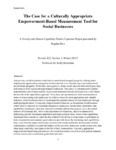| dc.rights.license | In Copyright | en_US |
| dc.creator | Bors, Bogdan Constantin | |
| dc.date.accessioned | 2017-05-19T13:26:29Z | |
| dc.date.available | 2017-05-19T13:26:29Z | |
| dc.date.created | 2017 | |
| dc.identifier | WLURG38_Bors_Poverty_2017_A | |
| dc.identifier.uri | http://hdl.handle.net/11021/33852 | |
| dc.description | Bogdan Constantin Bors is a member of the Class of 2017 of Washington and Lee University. | en_US |
| dc.description | Capstone; [FULL-TEXT FREELY AVAILABLE ONLINE] | en_US |
| dc.description.abstract | Anti-poverty social businesses which aim to assist disadvantaged groups by offering them employment opportunities emerged as a better alternative to classical top-down international development programs. While their main goal is to create social value for their employees, they still measure their success through financial indicators. They have to elaborate more suitable measurement tools of their success. Such social businesses should define poverty in the Senian framework of the capabilities approach. Then, they can operationalize their measurement in terms of empowering their employees. In order to create the most appropriate and valuable indicator, social businesses have to investigate the cultural context of their employees through anthropological lenses. Community Empowerment Solutions, an Ecuadorian social business which aims to empower its Quechuan indigenous employees, should firstly determine what capabilities Quechuans value and what empowerment spheres they pursue. Ayni, the central element of Quechuan life, refers to the importance of reciprocity, and is fundamental in elaborating specific Quechuan capabilities and empowerment areas. Some of the capabilities Quechuans have reasons to value are thus related to the ability to reciprocate, to participate in their communities and maintain good relationships with them. By increasing such capabilities, they would become empowered to have access to the social capital and the resources of their communities, contribute towards the balance of the universe, create new social connections, help other people and fully participate in the life of their communities. Culturally appropriate empowerment-based measurement tools for social businesses would be a more precise indicator of their success and would better guide their activities. | en_US |
| dc.description.statementofresponsibility | Bogdan Bors | |
| dc.format.extent | 34 pages | en_US |
| dc.language.iso | en_US | en_US |
| dc.rights | This material is made available for use in research, teaching, and private study, pursuant to U.S. Copyright law. The user assumes full responsibility for any use of the materials, including but not limited to, infringement of copyright and publication rights of reproduced materials. Any materials used should be fully credited with the source. | en_US |
| dc.rights.uri | http://rightsstatements.org/vocab/InC/1.0/ | en_US |
| dc.subject.other | Washington and Lee University, Shepherd Poverty Program | en_US |
| dc.title | The Case for a Culturally Appropriate Empowerment-Based Measurement Tool for Social Businesses | en_US |
| dc.type | Text | en_US |
| dcterms.isPartOf | RG38 - Student Papers | |
| dc.rights.holder | Bors, Bogdan Constantin | |
| dc.subject.fast | Social responsibility of business -- Evaluation | en_US |
| dc.subject.fast | Reciprocity (Psychology) | en_US |
| dc.subject.fast | Capabilities approach (Social sciences) | en_US |
| local.department | Shepherd Poverty Program | en_US |
| local.scholarshiptype | Capstone | en_US |
